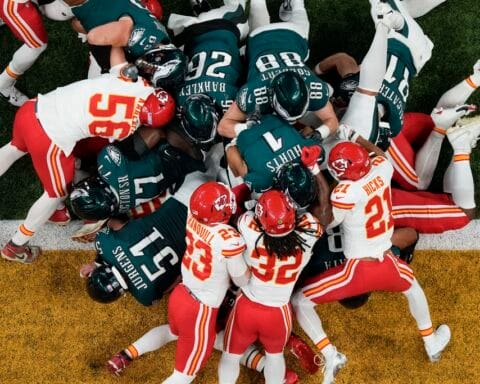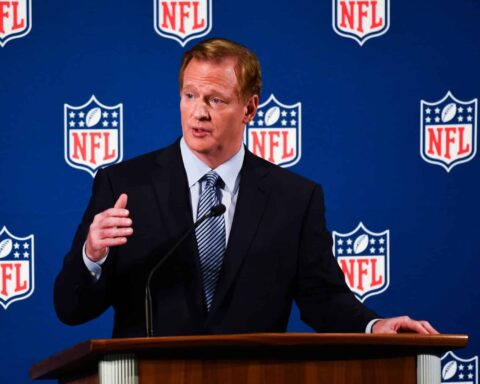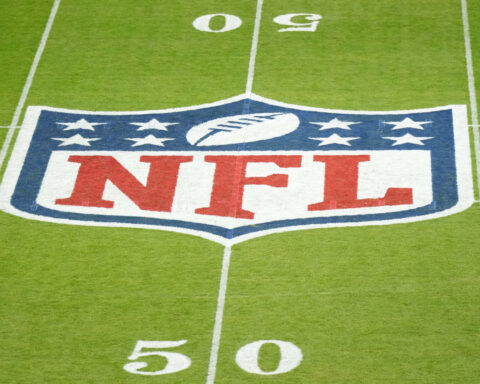“NFL games are competitive and unpredictable.”
That is the first sentence written on the NFL Operations page explaining the NFL’s regular season and postseason overtime rules. Fans may view teams very differently based on win-loss records. The NFL, however, seems to recognize the closeness in competitive ability from one team to another.
The Tampa Bay Buccaneers have found themselves in overtime situations twice this season. They did not score a touchdown either time.
Against Cleveland, the Browns won with a touchdown after they and the Bucs took turns ending drives with punts. Against Arizona, the Cardinals received the ball first but were forced to punt once. Then, Tampa Bay won with a field goal.
The Dallas Cowboys have also found themselves in overtime situations twice this season: against the Packers and against the Jaguars.
In both situations, they were never able to score in overtime. Both situations resulted in a loss.
Considering the competitive natures of both of these teams, it’s worth exploring how the change in postseason rules could impact decisions and outcomes.

What’s Different?
The new postseason rules are a bit different than what we’ve seen in the regular season for games tied at the end of regulation. Here are the major changes:
- The first overtime period will be 15 minutes instead of 10
- Both teams must have the opportunity to possess the ball at least once
- The exception to this is if the team on defense first scores a safety on the first receiving team’s initial possession
- Each team will be given three timeouts instead of two
- The timeouts are allotted per half, not per period
- In other words, if multiple 15-minute periods are required to declare a winner, teams will not get more timeouts until the third overtime period.
If the game is still tied after each team has had the opportunity to possess the ball, the next team to score will be declared the winner.
There are also other rules related to the coin toss and intermission between periods. For now, though, we’ll focus on how the possession rules could impact the results for the Cowboys.
How the new rules would help the Cowboys
If you’re following along, you can already see how the new rules would help the Dallas Cowboys should they end up in an overtime situation against the Tampa Bay Buccaneers.
The Bucs never scored a touchdown in overtime this season. As a matter of fact, they don’t score many touchdowns at all. In the 2022 regular season, they scored 32 total touchdowns and 31 field goals out of 38 attempts.
For the Cowboys, on the other hand, if they’ve shown us nothing else, they’ve shown they have the ability to score especially when the offense is led by Dak Prescott.
The Cowboys tallied 55 touchdowns during the regular season and 29 field goals out of 32 attempts. Of those 55 touchdowns, only 10 were scored during the games when Cooper Rush was the starting quarterback.
What this means is that there is a very good chance that even if the Bucs get the ball first, our defense will be able to hold them scoreless or limit them to a field goal.
Then, if the Cowboys follow that up with a touchdown, they will win.
Sounds simple, right?
How the new rules would NOT help the Cowboys
Unfortunately, in the overtime scenarios the Cowboys faced this season, these new rules would not have made a bit of difference.
Against the Packers, the Cowboys had the ball first. They made it all the way to Green Bay’s 35-yard line, then turned it over on downs. The Packers followed with a game-winning field goal on their next possession.
Against the Jaguars, the defense did its job and forced the Jags to punt. On the fourth play of the Cowboys’ drive, a pass intended for Noah Brown was intercepted and returned for a touchdown.
According to the postseason rules, the Jaguars would have still been declared the winner in that situation.
So, while the Cowboys’ ability to get into the end zone is an advantage on paper, the types of mistakes they’re prone to make could still end up costing them in a major way. Once again, we see a situation where the biggest threat to the Cowboys would be the Cowboys.
The real threat
Honestly, the best thing the Cowboys can do to increase their odds of advancing to the next round of the playoffs is to not go into an overtime situation in the first place.
They should do everything in their power to maintain a lead of two possessions or more against the Tom Brady-led Buccaneers.
Despite the losing regular season record, the low number of touchdowns scored, and the relatively low points per game, Brady has shown exceptional prowess at managing time at the end of close games.
Brady’s clutch gene
Against the Rams, the Bucs were down by three points with 44 seconds left in the game. They used 6 plays to go 60 yards in 35 seconds and scored a touchdown to win.
Against New Orleans, they were down by six with 2:29 left. In 2:26, they ran 11 plays to move 63 yards down the field and score a touchdown. The extra point gave them the lead and the win.
On the flip side, when the Bucs played the Falcons in Week 5, the Falcons were only down by 6 with just under 5 minutes left. But the Bucs ate 4:38 of game time with 11 plays, and the Falcons never got the ball back again.
The Cowboys said clock and game management would be worked on during this past off-season. Hopefully, they’ve improved enough in that area to counter whatever Tom Brady might try to do in the last few minutes of the 4th quarter.
Of the 25 touchdowns Brady scored in the regular season, 20 of them occurred in the red zone. Thirteen of them happened in the 4th quarter. His passer rating in the last two minutes of a half is 100.0. This is considerably higher than his overall rating of 90.7.
Ideally, the Cowboys will take care of business and not have to worry about overtime rules at all.






